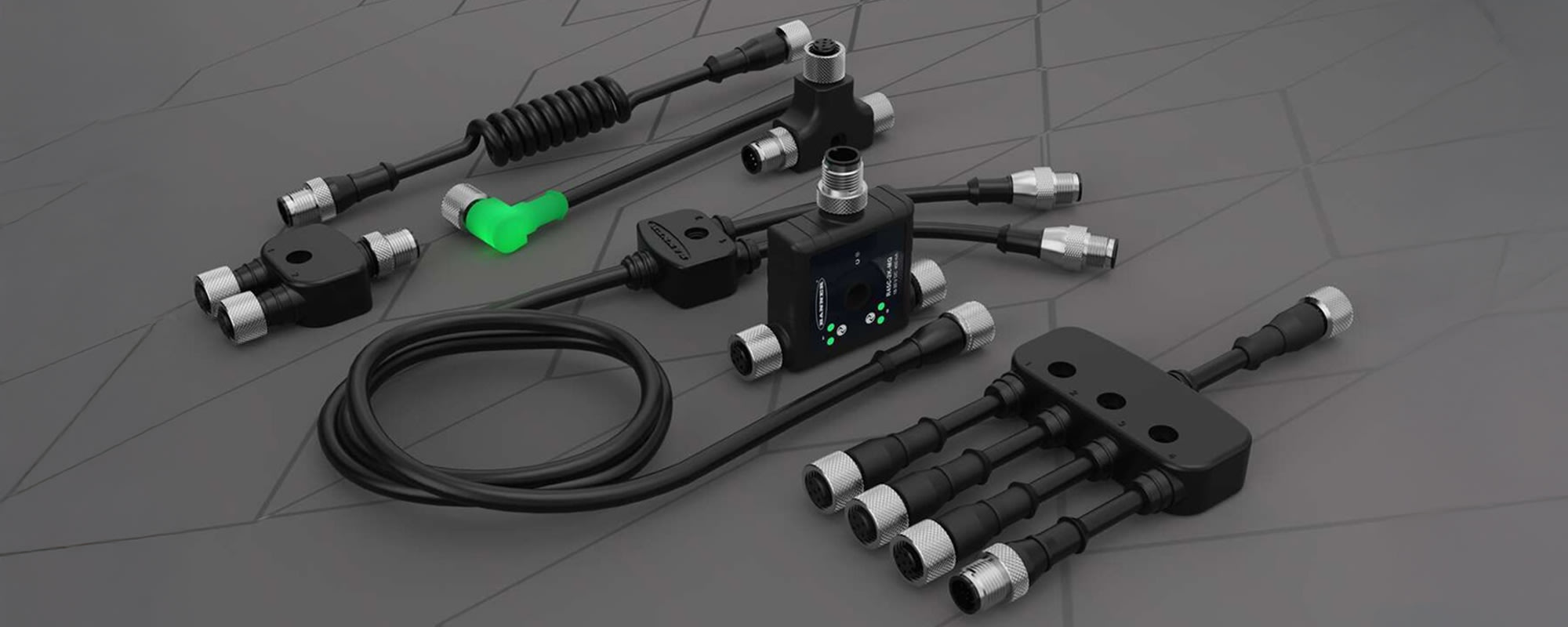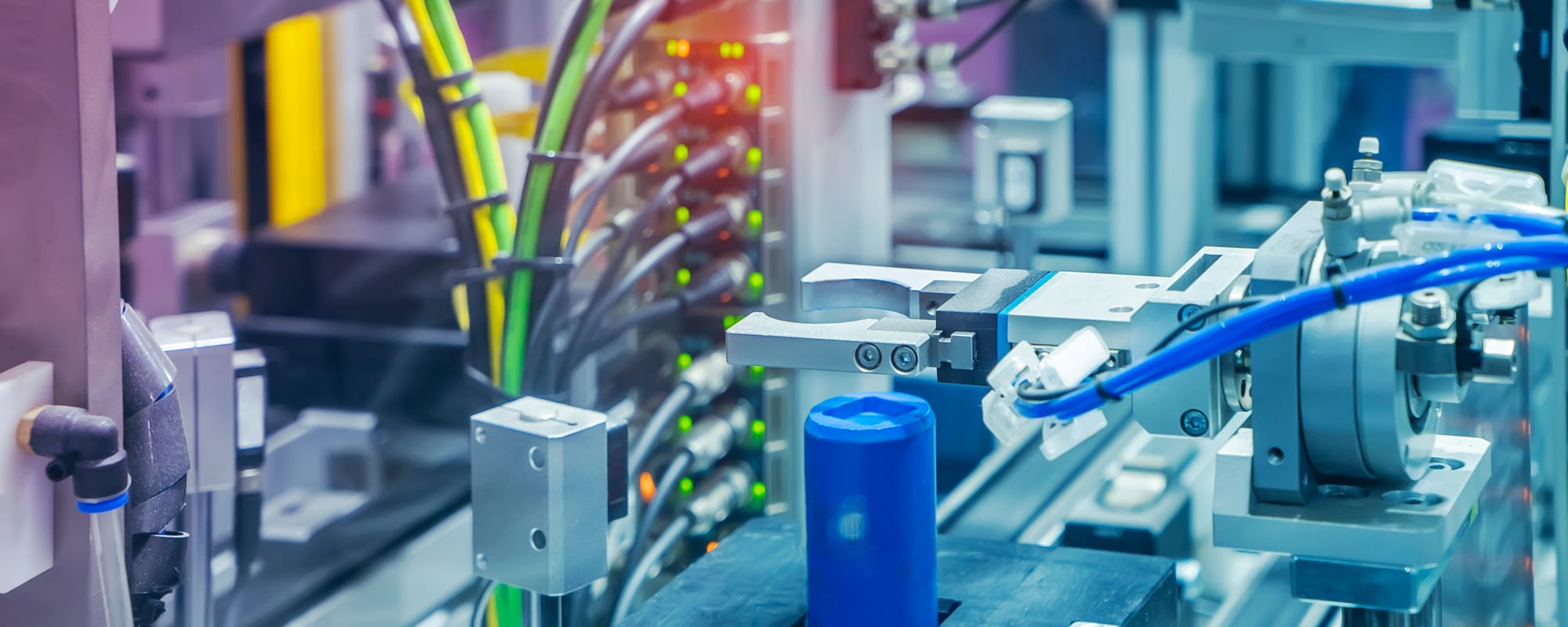MEAN WELL Field Application Engineer Harland Chen addresses motor drives and controllers, explaining how they work and the impact they can have on your power solutions, sharing tips for selecting the right motor drives and controllers for your industrial applications, and introducing MEAN WELL’s VFD Series variable frequency drive modules.
Motor drives and controllers are essential elements of industrial power solutions. We spoke with Harland Chen, Field Application Engineer, MEAN WELL USA, Inc., to learn more about motor drives and controllers. Harland explains the difference between motor drives and controllers, how they work, and the impact that they can have on your power solutions. He also shares tips for selecting the right motor drives and controllers for your industrial applications and introduces MEAN WELL’s VFD Series variable frequency drive modules.
Harland Chen, Field Application Engineer at MEAN WELL

Hi, please introduce yourself.
I am Harland Chen, a field application engineer at MEAN WELL. Ever since I was a kid, I was fascinated by the way things worked. I was especially curious about electronics and technology, so I knew I wanted a career in STEM.
After pursuing a degree in electrical engineering at San Jose State University in the Bay Area, I also got my master’s in electrical engineering. During that time, I immersed myself in various projects and internships that eventually led me to MEAN WELL.
As a MEAN WELL field application engineer, I collaborate across teams to help launch new products, evaluate product supply and market research, and identify customer needs. Additionally, I help with customer feedback by troubleshooting and finding solutions.
Please tell us about MEAN WELL.
MEAN WELL is one of the world’s leading standard power supply manufacturers. We were founded in 1982 and are headquartered in Taiwan, and our global distribution network for power supply solutions is spread out across Asia, Europe, and North America.
MEAN WELL is well known for durable, high-quality products and for providing customized and specialized support for its customers. As a result, we have become a preferred choice for power supply solutions worldwide.
You joined us today to talk about industrial motor drives and controllers. So, let’s start with motor drives. What are they and why are they important?
Motor drives are electronic devices used to control motors’ operating variables, including speed, torque, and direction. They play a crucial role in various industrial and commercial applications where precise motor control is required.
Motor drives work by adjusting inputs supplied to the motor — like frequency and voltage — based on signals from the sensor or control system. So, these devices are very important for efficiency, precision control, and equipment protection.
Motor drives allow motors to operate at the most effective speed for a given task, which can lead to efficiency improvements and significant energy savings. Motor drives can also adjust variables, like speed and torque, in a precise way to help motors achieve specific performance requirements while maintaining consistency, accuracy, and efficiency. Finally, motor drives aid in equipment protection. For example, they can provide stop/start, overload protection, and overvoltage protection features, which can help maintain the health of the motor over its lifecycle.
There are different types of motor drives. For example, variable speed drives (VSDs) are a type of motor drive that controls speed by regulating the power supply. There are also subsets of VSDs, such as variable frequency drives (VFDs). VFDs control motor speed based on frequency and are used in industrial applications including water pumps, fans, and compressors.
What are motor controllers, and how do they differ from motor drives?
Motor controllers are used to direct motor drives. Motor controllers receive analog control signals from control systems, convert them into digital signals, and send those digital signals to motor drives, while motor drives do the actual work. Controllers are like human brains in that they send the commands, while motor drives are like human bodies that move in response.
Motor controllers integrate motor specifications, which include the parameters or variables of the drive, using software or firmware. Without that input, they wouldn’t be able to identify connected motors or send accurate signals.
Controllers are important because, without them, motors would be limited to performing simple operations — such as being on or off, for example. When equipped with a motor controller, a motor drive can operate at varying settings. Once you’ve got more than a single operating variable, such as speed, direction, or frequency, you’ll need to employ a motor controller.
What types of applications require motor drives and controllers?
Examples of common applications that require motor drives and controllers include:
- HVAC systems, which have varying speeds and fan directions.
- Industrial automation systems, such as conveyor belts, robotic arms, assembly lines.
- Automotive and transportation and vehicles, including electric vehicles, trains, and ships.
VFDs, for instance, can work in concert with different motors, such as three-phase motors. These electric motors operate using three phases of AC power and are widely used in industrial and commercial applications due to their efficiency, reliability, and versatility.
There are also different types of three-phase motors, including induction motors, brushless DC (BLDC) motors, and synchronous reluctance motors.
- Induction Motors are the most common three-phase motors and utilize the principle of electromagnetic induction. The advantage of these motors is that they are suitable for a wide range of applications, including compressors, water pumps, and ventilation systems.
- BLDC Motors use electronic commutation for control, and they often have a longer lifespan than other motors. BLDC motors have a loader inside the motor, which senses the electromagnetic differences in the motor, and are commonly used in home appliances, countertop equipment, and commercial ovens.
- Synchronous Reluctance Motors operate on the principle of reluctance torque. They are highly efficient, have high torque density, and are widely used in machine tools and robotics.
Three-phase motors play a critical role in leveraging Industry 4.0 and wireless industry trends. When combined with advanced motor drives and controllers, they enable seamless integration into smart industry setups and provide a high level of connectivity. In addition, their high energy efficiency helps contribute to sustainability goals. For example, while a traditional DC motor may need 400 watts of energy, a BLDC motor would only require a fraction of that amount and have a longer lifespan.
There are many different motor drives and controllers on the market. Are there any key characteristics that customers should look for when evaluating their options?
Yes, there are several factors that customers should consider when selecting motor drives and controllers. These can include:
- Size and Weight – Motor drives and controllers with a smaller footprint can fit into existing systems more easily, especially when space is limited.
- Electrical Rating – Motor drives and controllers need to be compatible with a system’s electrical ratings to avoid performance issues and damage.
- Reliability and Durability – High-quality materials lend themselves to reliability and, in turn, reduce downtime, increase safety, and save customers time, money, and energy.
- Environmental Protections – For applications in harsh environments, select motor drives and controllers with extra protections against hazards, including dust and high temperatures.
- Testing and Troubleshooting – Sourcing motor drives and controllers from a company with robust customer service can help when it comes to troubleshooting and other challenges that customers may face.
It’s important to select the right motor drive for your system to maximize its benefits. Selecting the right motor drive will allow you to optimize your system and operate at the highest efficiency and will also save you time and money. With some models, you can even take advantage of the latest innovations in Industry 4.0 technology, such as digital connectivity.
Further, selecting products from a company capable of satisfying all of your needs, both now and in the future — like MEAN WELL — provides customers with a full range of options backed by the proven experience, quality, and customer support.
What’s unique about MEAN WELL’s industrial motor drives and controllers?
MEAN WELL motor drives are built with reliability and efficiency in mind, and our extensive product portfolio gives customers a wide range of options. MEAN WELL offers VFDs for both for AC and DC circuits and a wide variety of voltage ranges. Additionally, MEAN WELL continually invests in the research and development needed to create innovative solutions and pass critical knowledge along to our customers.
One of the most important factors when considering your choices of motor drives and controllers should be application support. This is another area in which MEAN WELL stands out. MEAN WELL has a vast collection of experience and knowledge, combined with a strong technical support system, and provides customers with top-notch service, solutions, and assistance. Our customer support capabilities also make it easy for customers to request customize solutions optimized for their specific application needs.
Power solutions — which combine a motor drive with a corresponding controller — are not a one-size-fits-all selection. Many applications have specialized needs. But our expert customer support team is well experiences in troubleshooting challenges and delivering customized solutions.
Please tell us about MEAN WELL’s VFD Series variable frequency drive modules.
MEAN WELL’s innovative VFD series is comprised of fanless, three-phase motor drive modules that are optimized for energy savings, exhibit up to 93% efficiency, and provide a 200% peak current. It also comes with integrated short-circuit protection and complies with international safety standards (IEC/EN61800-5-1) and electromagnetic compatibility standards (IEC/EN61800-3). The series currently features eight different models that cover both AC and DC input voltages and are available with or without an enclosure. The AC-input models also feature power factor correction (PFC) ranging from 150 to 750W.
Examples of some of the different models include:
- PCB-Type Low-Voltage DC-Input Models: MEAN WELL developed these variable frequency motor drive modules based on considerations for low-power motor applications, like portable power tools and fans. These use a battery as their main source of power, so they don’t have to physically connect to an AC outlet.

PCB-Type Universal-AC-Input Models With PFC: These VFDs are compact and low-profile and well-suited for applications that require an AC outlet but a simple power cord, like demo kits or household webcams. Their power factor correction capabilities can also help customers use less energy.

Enclosed-Type Universal-AC-Input Models With PFC: These VFDs with PFC have stronger motors that are best suited for higher-power needs, including applications in outdoor environments, like water pumps in swimming pools, and commercial applications, like ventilation systems.

Are there any success stories you’d like to share about MEAN WELL’s VFD Series?
Yes, we recently had a customer with a BLDC motor that they needed to automatically change direction after a certain period of time. We were able to work with them to evaluate their motor and operations needs and realized that standard off-the-shelf solutions wouldn’t suffice. Since MEAN WELL is well experienced in providing extensive customer support and product customization, we realized that we needed to revise the script code and had our technical experts code the timing operation into the software to fit the customer’s precise parameters.
Ultimately, whenever you get a VFD, we encourage you to reach out and utilize our team to ensure that you can take full advantage of all we can offer.
Is there anything else you’d like RS customers to know about MEAN WELL or its VFD Series motor drives?
Power solutions are not one size fits all, and the motor drives and controllers that comprise them aren’t interchangeable across applications. Power solutions are often designed for a specific application or purpose. So, it’s imperative that you select the ones that will best suit your needs. This is another reason why choosing a trusted brand, like MEAN WELL, or a trusted distribution partner, like RS — who have the experience and expertise to help you identify, install, and maintain the drives and controllers optimized for your motors — is so important.
MEAN WELL and RS: Your Trusted Partners for Specialized Power Solutions
MEAN WELL is a leading global supplier of standard power supply products renowned for its vast portfolio of application-specific solutions, its extensive customization capabilities, and the quality and performance of its products.
RS offers thousands of MEAN WELL power products, including power supplies, converters, inverters, battery chargers, uninterruptible power supplies (UPS), and the VFD series motor drives. For more information about MEAN WELL and its extensive selection of standard power supplies, please visit the links embedded here. For assistance identifying, procuring, deploying, and maintaining MEAN WELL power products sure to satisfy your unique application demands, please contact your local RS representative at 1.866.433.5722 or reach out to the RS technical support team.







